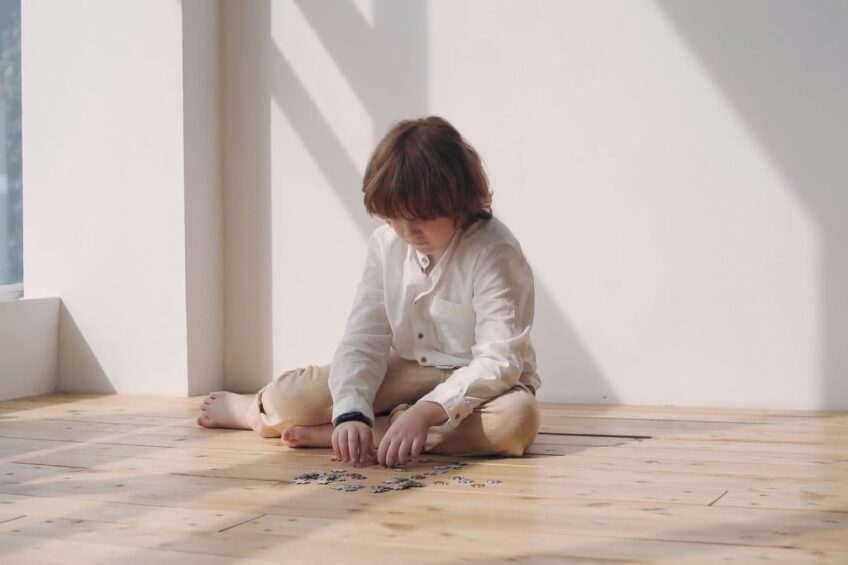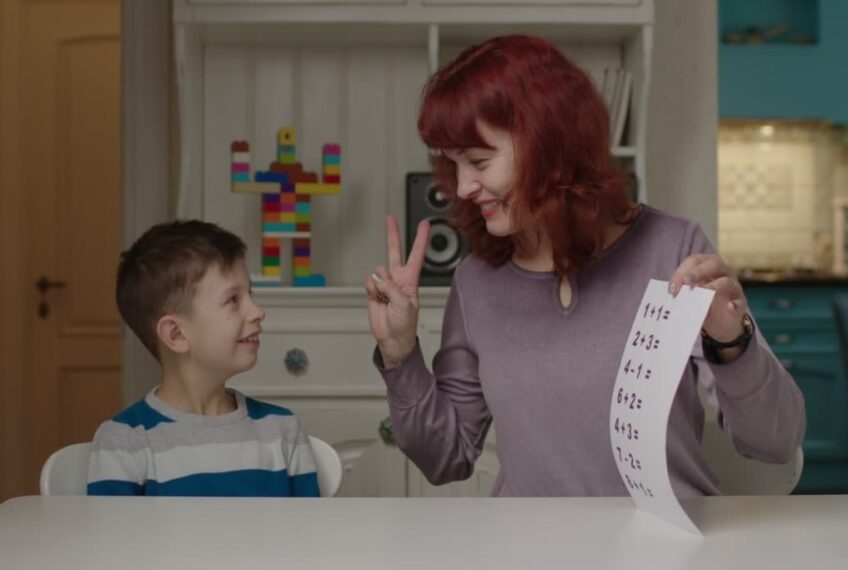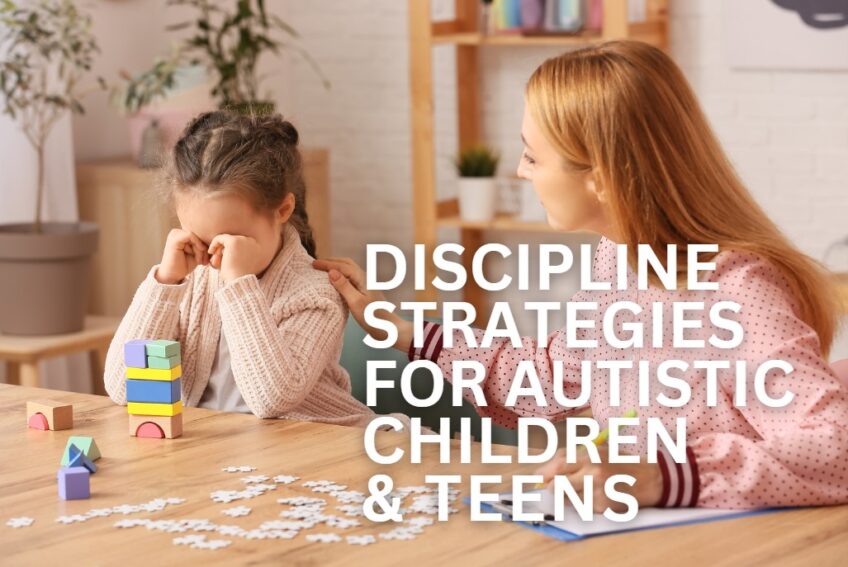As a parent, it can be difficult to balance the need for discipline and the sensitivity required when parenting an autistic child. You need effective strategies that promote positive behavior and help your autistic child or teen learn appropriate conduct.
Here, we provide our top advice for disciplining autistic children and teens with compassion.
Children and teens with autism spectrum disorder (ASD) can experience difficulties with communication, social interactions, and behaviors. This can make discipline and behavior management challenging for parents, caregivers, and educators.
Effective discipline strategies are essential to help children and teens with ASD develop social skills, self-control, and positive behavior patterns. Successful strategies include positive reinforcement, visual schedules, and clear communication. It’s important to understand the individual needs and preferences of each child or teen with ASD and to tailor discipline strategies accordingly.
With patience, consistency, and a commitment to positive reinforcement, caregivers can help children and teens with ASD learn and grow to their fullest potential.
Understanding the Challenges of Autistic Children and Teens
Effective discipline strategies for autistic children and teens need a different approach due to the unique challenges they face.
Here are some things to keep in mind when choosing discipline strategies for autistic children and teens:
Understand that autism is a neurological disorder that affects behavior and social skills. Children with autism may not always be able to understand or regulate their emotions.
Give clear and consistent rules and consequences. Children with autism benefit from routine and clear expectations.
Use positive reinforcement to encourage good behavior. Instead of using punishment for negative behavior, reward desired behavior with praise or tangible items.
Use visual aids such as charts, schedules, and pictures to help children with autism understand expectations and consequences.
Remember that every child with autism is different and may respond differently to discipline strategies. Work with a professional or a therapist who can help you develop a strategy that is tailored to your child’s specific needs.
Positive Discipline Strategies

Disciplining autistic children and teens can be challenging, but with the right strategies, you can help promote positive behavior, boost their self-esteem, and strengthen your relationship with them.
Here are some positive discipline strategies that you can use:
Create a predictable and structured environment that helps your child or teen feel safe and comfortable. Use positive reinforcement, such as verbal praise or rewards, to encourage good behavior and communication. Keep your instructions clear and concise, and give your child or teen ample time to process the information.
Be patient and understanding, and try to see issues from their perspective. Use calming techniques, such as deep breathing or mindfulness exercises, to teach your child or teen how to self-regulate their emotions.
By using positive discipline strategies, you can help your child or teen with autism develop the skills they need to thrive and succeed.
Setting Limits and Boundaries

Setting limits and boundaries is one of the most effective discipline strategies for autistic children and teens. Clear boundaries help children understand what is expected of them and feel safe and secure in their environment.
Here are some tips for setting limits and boundaries for your autistic child or teen:
Create a visual schedule or routine that includes clear expectations and consequences for behavior. Use positive language to reinforce good behavior and redirect negative behavior.
Use social stories or visual cues to help your child understand complex social situations and behaviors. Give your child or teen enough time to process and transition between activities to avoid anxiety and meltdowns.
Remember, every child is different, and it may take some trial and error to find the most effective discipline strategies for your autistic child or teen. Stay patient and consistent, and always seek support and advice from trained professionals.
Building Positive Relationships

Building positive relationships with autistic children and teens requires unique and effective discipline strategies that consider their individual needs and challenges.
Here are some tips to help parents or caregivers discipline autistic children and teens effectively while building positive relationships:
- Positive reinforcement: Praise and reward positive behavior to encourage repetition. Ensure the reward itself aligns with the interest of the child.
- Clear Communication: Speak to the child in plain language and use visual aids to convey your message. Use short sentences and emphasize essential words.
- Consistency: Establish a routine and observe the consistency in rules and regulations to make the child feel secure.
- Redirection: Shift the child’s focus from negative behavior to more acceptable activities.
- Sensory Breaks: Use sensory calming techniques such as a favorite toy or play to relieve the child of the moment’s tension.
Promoting Self-Regulation

Self-regulation is an essential skill for children with autism to learn, and there are effective discipline strategies that parents and caregivers can use to promote it.
Here are some techniques to try:
Create a consistent routine: Children with autism thrive on predictability and familiarity. Creating a predictable routine can help them feel more in control and reduce the likelihood of outbursts.
Use visual aids: Children with autism often respond well to visual cues. You can use pictures, charts, and schedules to help them understand routines, expectations, and consequences.
Offer choices: Giving children with autism choices can help them feel empowered and reduce power struggles. Offer them choices within limits, such as “Do you want to wear the red shirt or the blue shirt?”
Be patient and compassionate: Finally, it’s important to approach discipline with patience and compassion. Children with autism may struggle with self-regulation, but with patience and consistent reinforcement, they can learn to manage their behavior effectively.
FAQs

How can parents and caregivers balance discipline with empathy and understanding?
Parents and caregivers can balance discipline with empathy and understanding by focusing on positive reinforcement, offering alternatives and choices, and taking the time to understand and respond to the child’s needs.
Are there any specific discipline strategies that may work better for teenagers with autism?
Teenagers with autism may respond well to strategies that involve goal-setting, problem-solving, and offering choices and alternatives.
Can discipline strategies for autistic children and teenagers be used in school and other settings?
Yes, they can be adapted and used in school and other settings to support the child’s behavior and development.
What role can therapy and counseling play in supporting effective discipline strategies for autistic children and teenagers?
Therapy and counseling can provide parents and caregivers with additional tools and strategies to effectively discipline and support autistic children and teenagers.
How can parents and caregivers handle challenging behaviors in a positive and effective manner?
Handling challenging behaviors in a positive and effective manner can involve offering choices and alternatives, using positive reinforcement, and setting clear expectations and consequences.
How can parents and caregivers ensure that discipline strategies are fair and consistent for all children in the family, including those with autism?
Parents and caregivers can ensure fairness and consistency by setting clear expectations and consequences for all children, communicating these to the entire family, and consistently enforcing them.
Can discipline strategies for autistic children and teenagers be adjusted over time as the child’s needs change?
Yes, they should be adjusted over time as the child’s needs change and as they progress in their development.
What resources are available for parents and caregivers seeking support and guidance with discipline strategies for autistic children and teenagers?
Resources for parents and caregivers can include support groups, therapy and counseling, and online resources and forums.
Conclusion
In conclusion, effective discipline strategies for autistic children and teens involve a tailored approach that takes into account their individual needs and communication style. Punitive measures such as time-outs or spankings can often have adverse effects on autistic children and teens, leading to increased anxiety and challenging behavior. Instead, positive reinforcement techniques like building a reward system or incorporating interests into chores can promote communication and reduce undesired behaviors.
Consistency, clear expectations, and patience are key to successfully implementing a discipline plan for autistic children and teens. Seek advice from professionals like therapists, teachers, or support groups, to develop an individualized plan that supports the child’s distinctive learning strengths and communication skills.

